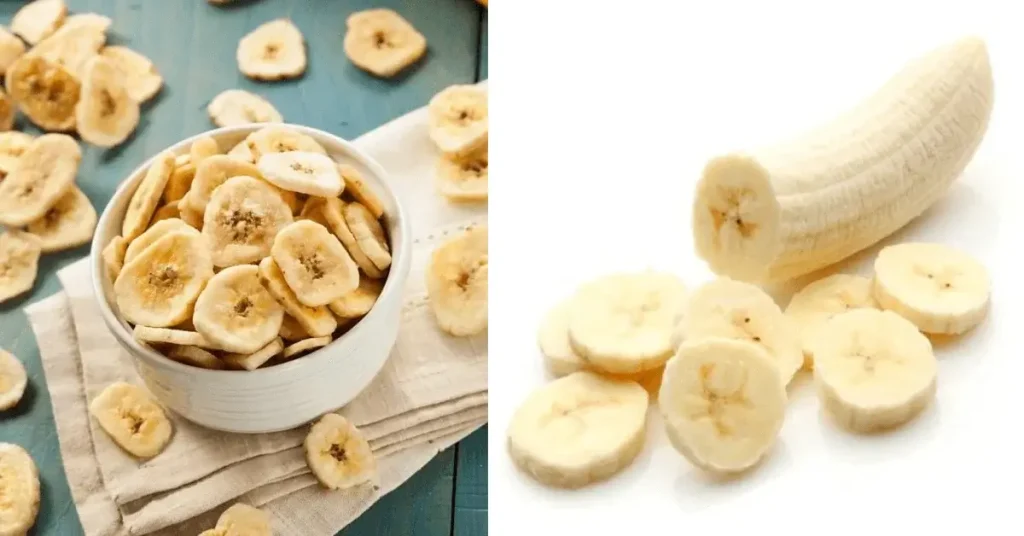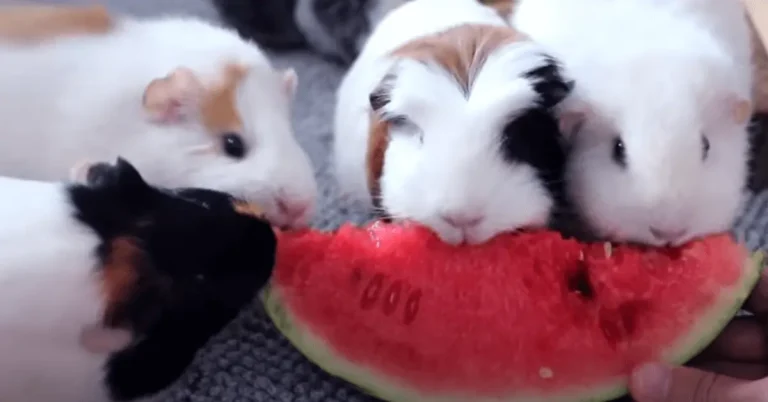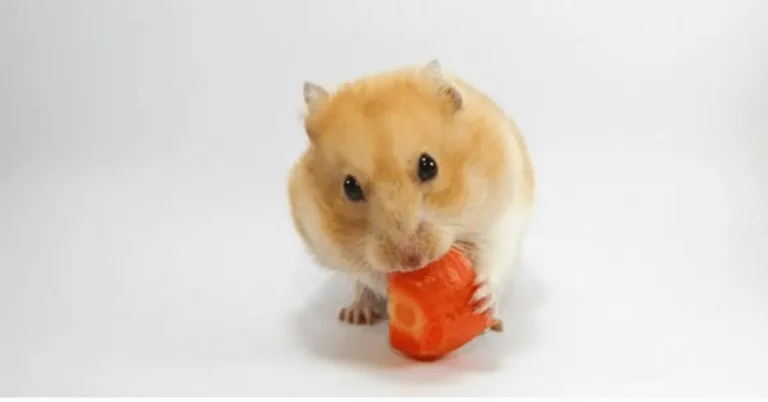A common question often arises: Can guinea pigs eat bananas? These charming and gentle companions have captivated the hearts of pet owners worldwide. If you’re a proud cavy owner, you’re likely aware of the importance of providing a balanced and nutritious diet for your furry friend.
In this comprehensive guide, we explore about delightful world of guinea pig nutrition, with a specific focus on the delectable and tropical treat, bananas. Let’s find out the secrets of this tasty treat and whether it’s okay for your cavy to have it. Get ready for a tasty adventure as we look at the good and not so good things about giving bananas to your guinea pig.
Can Guinea Pigs eat Bananas?
Yes, guinea pigs can eat bananas, but it should be done in moderation. Bananas can offer some nutritional benefits to guinea pigs due to their potassium content, which can aid in growth. However, it’s essential to provide small, age-appropriate portions to avoid overfeeding and digestive issues. As with adult guinea pigs, it’s important to maintain a balanced diet for baby guinea pigs and consult with a veterinarian for guidance on their specific dietary needs.
Guinea Pigs’ Dietary Needs
Guinea pigs, scientifically known as Cavia Porcellos, are herbivores with a diet that naturally consists of grasses, hay, herbs, seeds, fruits, vegetables, and various forms of plant matter. However, while hay and grass should make up the majority of their diet, these small creatures may lack certain essential vitamins and minerals.
The Banana Debate
Guinea pigs eat banana and they are a beloved fruit in many households due to their sweet taste, convenience, and various health benefits for humans. Moreover, animals like elephants, birds, monkeys, and even bats enjoy wild bananas. But what about guinea pigs? Can they enjoy bananas as we do?
The short answer is yes, guinea pigs can eat bananas, but there are important considerations to keep in mind.
The Advantages of Feeding Bananas
Just like humans, guinea pigs can benefit immensely from the potassium and vitamin C found in bananas. Let’s delve into the nutritional benefits of this popular fruit:
- Potassium: One of the standout features of bananas is their potassium content. Potassium is an essential mineral that not only helps internal organs like the heart, lungs, and kidneys function properly but also regulates healthy blood flow, fights arthritis, and minimizes muscle cramps. In fact, a single gram of banana contains approximately 3.6 mg of potassium, making it an ideal natural source for guinea pigs.
- Vitamin C: Vitamin C is crucial for guinea pigs, as a deficiency can lead to scurvy. Scurvy can manifest as poor bone and skin health, excessive weight loss, and a diminished immune system. Guinea pigs do not synthesize their vitamin C, making it necessary to obtain it from their diet. Bananas, along with other fruits and vegetables, provide a valuable source of vitamin C, effectively preventing health issues such as scurvy.
The Disadvantages of Feeding Bananas
However, there are a few reasons why bananas should be offered as a treat rather than a staple in a guinea pig’s diet:
- High Sugar Content: Bananas are relatively high in sugar, which can lead to an upset stomach or diarrhea shortly after consumption, promoting obesity and diabetes in the long term.
- Digestive Issues: The high fiber content in bananas can lead to bloating, cramping, and gas in guinea pigs. Therefore, it’s essential to provide them with a small amount of banana occasionally, typically no more than 10-15 grams per week.
- Kidney Concerns: While potassium is generally beneficial for guinea pigs and can support kidney health, it should be avoided for guinea pigs with pre-existing kidney issues. Excessive potassium can overwhelm the kidneys, making the guinea pig sick or even leading to a fatal outcome.
Are Bananas Safe and Healthy for Guinea Pigs?
Bananas Are Good for Young Guinea Pigs
Bananas are known for their health benefits in humans, especially for athletes due to their high potassium content. Surprisingly, the benefits of potassium also apply to guinea pigs, but mainly for the young ones. When combined with a high-protein diet, potassium can significantly enhance the growth of young guinea pigs so give them to guinea pigs eat banana.
Bananas and Young Guinea Pigs: A Winning Combination
guinea pigs eat bananas because it is a rich source of Potassium and it is a vital mineral present in bananas, plays a crucial role in supporting the growth and development of young guinea pigs. This mineral aids in the proper functioning of their internal organs, including the heart, lungs, and kidneys. Additionally, potassium helps regulate healthy blood flow, minimizes muscle cramps, and even offers protection against conditions like arthritis.
Guinea pigs eat bananas and for young guinea pigs, who are in their prime growing stage, potassium from bananas can be a game changer. The high nutritional value of bananas, coupled with other essential components of their diet, fosters optimal growth and development.
Lowers the Risk of Kidney Stones
Guinea pigs eat bananas and are prone to kidney stones, a painful condition that can disrupt their well being. Fortunately, the high potassium content in bananas can be a valuable addition to their diet to help prevent kidney stones. Regular potassium intake is essential for maintaining healthy kidneys in guinea pigs.
Bananas: A Natural Defense Against Kidney Stones
Guinea pigs eat banana and it can plays role in many factor as Kidney stones can be a severe concern for guinea pigs. These tiny creatures have delicate urinary systems, making them vulnerable to the formation of stones. Bananas, with their potassium rich goodness, assist in keeping these kidneys in top shape.
The key lies in potassium’s ability to regulate fluid balance and prevent the accumulation of substances that could lead to the formation of kidney stones. While not a guarantee, bananas are a natural way to support your guinea pig’s kidney health.
Guinea pigs eat banana: Preventing Scurvy
Guinea pigs, like humans, cannot produce vitamin C internally and rely on external sources. A deficiency in vitamin C can lead to scurvy in guinea pigs, a condition characterized by fatigue, weakness, and swollen joints. Fortunately, bananas contain this essential vitamin.
Vitamin C: A Scurvy Buster
The presence of vitamin C in bananas is a significant advantage for guinea pigs. This essential vitamin boosts their immune system, helping them ward off illnesses and infections. Vitamin C also plays a crucial role in maintaining connective tissue and ensuring the balance of internal organs.
Guinea pigs eat banana and scurvy, a disease that arises from vitamin C deficiency, is a genuine concern for guinea pigs. Bananas, with their vitamin C content, can be a valuable addition to their diet to prevent this condition. Guinea pigs eat bananas, however, it’s essential to offer them in moderation to reap the scurvy preventing benefits.
Incorporating bananas into your guinea pig’s diet can offer a range of health benefits. Whether you’re caring for a young cavy or an adult, the potassium and vitamin C in bananas can be a valuable addition to their diet. However, always remember that moderation is key to keeping your furry friends healthy and happy.
A Balanced Diet for Guinea Pigs
While bananas have their advantages, they should be part of a well-balanced diet for guinea pigs. Their primary diet should consist of fresh hay, high-quality pellets, and occasional servings of fresh vegetables and fruits, including bananas. Guinea pigs eat bananas and also enjoy it. Always consult with a veterinarian for specific dietary recommendations tailored to your guinea pig’s needs.
Nutrition Facts of Bananas for Guinea Pigs

Bananas are very nutritious and especially for guinea pigs here is a nutritional values of 100 grams of banana.
| Nutrition | Amount |
| Energy | 89 kcal |
| Carbs | 22.84 g |
| Fats | 0.33 g |
| Magnesium | 27 mg |
| Potassium | 358 mg |
| Fiber | 2.6 g |
| Manganese | 0.27 mg |
| Calcium | 5 mg |
| Sodium | 1 mg |
| Vitamin C | 8.7 mg |
| Vitamin A | 64 IU |
| Vitamin B6 | 0.367 mg |
| Protein | 1.09 g |
| Iron | 0.26 mg |
| Folate | 20 µg |
Guinea Pigs eat Bananas: Tips for the Perfect Serving Size and Frequency
Can Guinea Pigs eat Bananas Every Day?
Guinea pigs eat bananas but should not give them daily. Bananas can be a healthy addition to a guinea pig’s diet, offering nutrients like potassium and vitamin C. However, it’s crucial to feed them in moderation. Experts recommend small servings of bananas once or twice a week to prevent digestive issues like bloat, gas, and cramps.
Overindulgence can lead to discomfort and distress in guinea pigs. To strike the right balance, follow portion control, limit frequency, and ensure bananas complement their regular diet of hay, pellets, and vegetables.
Guinea pigs can eat only a small piece of bananas not the whole one keep in mind they are too small than us. Give them a small tiny piece or half banana. If your Guinea pig like banana peel not throw whole banana peel in their cage it also give them in small piece. If you overdose then consult with a vet for personalized dietary guidance to keep your furry friend happy and healthy.
Guinea Pigs Like Bananas?
Guinea pigs like bananas because they are fruity and tasty. Just like humans guinea pigs like and eat all types of fruit like such as blueberries, apples, grapes, raspberries, oranges, and many others, because fruits are rich source of fiber and vitamin C.
Guinea pigs eat banana every time when you offer to them but give them only in moderation due to banana has high amount of sugar that is harmful in extra amount for your cavy.
Can Baby Guinea Pigs Eat Bananas?
Baby guinea pigs eat bananas but in the initial weeks after birth, baby guinea pigs primarily rely on their mother’s milk and a diet hay. It’s important not to introduce bananas or any other fruits or vegetables during this early period.
Once a few weeks have passed, you can gradually introduce small amounts of vegetables and fruits into a baby guinea pig’s diet, but it should be done gradually. Bananas, with their potassium content, can be beneficial for the growing guinea pigs. However, moderation remains key to preventing digestive issues and other health problems.
Guinea pigs eat banana and balancing their diet is vital, and consulting a veterinarian can provide guidance on the specific dietary needs of your baby guinea pig, ensuring they grow healthy and strong.
Can Guinea Pigs Eat Banana Peels?
Yes, Guinea pigs can eat banana peels safely. These peels offer valuable fiber, vitamins, and minerals. To ensure safety, wash the peels to remove harmful substances if any. Offer them in small, bite sized portions to prevent choking. Banana peels should be an occasional treat, not a dietary replacement. Remember to maintain a balanced diet for your guinea pig, and consult with a veterinarian for personalized dietary advice.
Can Guinea Pigs Eat Banana Peppers?
No, guinea pigs should not eat banana peppers. Banana peppers, like other hot peppers, are not suitable for guinea pigs. They are spicy and can cause digestive discomfort and irritation to their sensitive digestive systems. It’s essential to stick to safe and guinea pig friendly vegetables and fruits when providing them with treats.
Can Guinea Pigs Eat Banana Chips?
No, Guinea pigs should not eat banana chips. While they may enjoy the taste of these dried snacks, they are high in sugar and fat, which is not suitable for guinea pigs. Feeding banana chips to guinea pigs can lead to weight gain, digestive problems, and other health issues. It’s best to stick to fresh fruits and vegetables as occasional treats for your guinea pig and avoid processed or dried snacks like banana chips.

Can Guinea Pigs eat Banana Cookies?
Guinea pigs can enjoy specially made banana cookies designed for them, which are available in pet stores. However, it’s crucial to avoid giving them banana cookies intended for human consumption.
Due to their highly sensitive digestive systems, guinea pigs should only have these cookies on occasion and in small portions. While some guinea pig owners opt to prepare homemade banana cookies for their pets, it’s essential to prioritize their well-being by primarily feeding them fresh vegetables, fruits, and hay to ensure they lead a healthy and long life.
Can guinea pigs eat green bananas?
Yes, guinea pigs can eat green bananas, but they may not like them as much as ripe, yellow bananas. Green bananas are less sweet and have a starchy taste due to their higher starch content.
They are safe for guinea pigs to eat, it’s essential to provide them in moderation and as part of a balanced diet that includes a variety of fruits and vegetables. Most guinea pigs prefer ripe, yellow bananas because they are sweeter.
Can Guinea Pigs Eat Banana Leaves?
Yes, Guinea pigs can eat banana leaves without any harm. These leaves are safe and can be a part of their diet. However, it’s essential to offer banana leaves in moderation. While guinea pigs may find them interesting to nibble on, they should not make up the majority of their diet. Guinea pigs have specific dietary requirements, which include hay, fresh vegetables, and fruits.
Banana leaves can be a refreshing and occasional treat for guinea pigs, adding some variety to their diet. However food should consist of hay, which is crucial for their dental health and digestion, along with a selection of fresh vegetables and fruits to provide a well rounded and nutritious diet.
Can Guinea Pigs Eat Banana If It’s Brown?
Yes, guinea pigs can eat brown bananas. Brown bananas are overripe and may have a softer texture and sweeter taste compared to yellow bananas. While guinea pigs can consume brown bananas, it’s essential to provide them in moderation, just like any other type of banana. Make sure to remove any spoiled or moldy parts before serving the banana to your guinea pig. Guinea pigs generally prefer ripe, yellow bananas, but brown bananas can be an occasional treat if they are still in good condition.
Can Guinea Pigs Drink Banana Juice?
No, It is not recommended to give guinea pigs banana juice. While guinea pigs do need a source of vitamin C in their diet, and fruits like oranges or kiwi can be suitable options, banana juice is not a typical choice.
Banana juice is not a common juice for guinea pigs, and it’s essential to be cautious about providing any fruit juice to them. Fruit juices can be high in sugar and lacking in essential nutrients. It’s best to stick to fresh fruits and vegetables as the primary source of nutrition for guinea pigs.
Can Guinea Pigs Eat Banana Bread?
No, Guinea pigs should not eat banana bread. Banana bread is a human-made baked product that typically contains ingredients like flour, sugar, and often butter or oil, which are not suitable for guinea pig consumption. These ingredients are not part of a guinea pig’s natural diet and can be harmful for them.
Feeding guinea pigs sugary or high fat foods like banana bread can lead to health issues such as obesity, digestive problems, and dental issues. It’s best to stick to a guinea pig’s natural diet of hay, fresh vegetables, and fruits in moderation.
Facts about Bananas
Here are some quick facts about bananas:
- Bananas originated in Southeast Asia and are tropical fruits.
- Botanically, bananas are considered berries, not fruits.
- They are grown in over 150 countries worldwide.
- There are numerous banana types, each with distinct flavors and sizes.
- Bananas are naturally sweet due to their high sugar content.
- They provide a rapid energy boost, thanks to their carbohydrates and potassium.
- Bananas contain vitamin C, vitamin B6, and dietary fiber.
- Known for their potassium content, essential for heart health and muscles.
- Bananas are a versatile ingredient used in various dishes, from smoothies to desserts and savory meals.
- Banana peels are edible and can be used in cooking or as a natural fertilizer.
conclusion
Guinea pigs eat banana and can indeed enjoy the occasional treat of them. These sweet and tropical fruits offer valuable nutrients like potassium and vitamin C, which can contribute to their well-being. However, it’s crucial to exercise moderation in feeding bananas to guinea pigs, as their high sugar and fiber content can lead to health issues if overindulged.
Remember that bananas should be just a small part of a balanced diet for your guinea pig, primarily consisting of hay, fresh vegetables, and a high-quality pellet food. By offering this delectable fruit as an occasional snack, you can treat your furry friend while ensuring their overall health and happiness. Always consult with a veterinarian for specific dietary recommendations tailored to your guinea pig’s unique needs.







